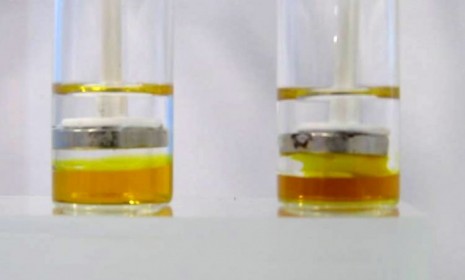The magnetic soap that could clean up oil spills
British scientists devise a way to use magnetically charged cleaning solutions to make sticky clean-ups even easier

A free daily email with the biggest news stories of the day – and the best features from TheWeek.com
You are now subscribed
Your newsletter sign-up was successful
British researchers have found a way to imbue soap with magnetic properties, which could have huge implications in the way we fight ecosystem-damaging oil spills. Here's why making the slippery stuff magnetic could be a game changer:
Soap helps clean up environmental disasters?
It does. Dispersants and "surfactants," the technical name for soap, are added to water along with other chemicals to help break up hazardous oil, such as during the 2010 Deepwater Horizon disaster in the Gulf of Mexico. But such procedures are not without their costs. These chemicals are themselves hazardous to the environment (though not to the degree of the oil they break up), and are painstakingly difficult to collect. They can do a lot of damage to sea life before they break down or get diluted.
The Week
Escape your echo chamber. Get the facts behind the news, plus analysis from multiple perspectives.

Sign up for The Week's Free Newsletters
From our morning news briefing to a weekly Good News Newsletter, get the best of The Week delivered directly to your inbox.
From our morning news briefing to a weekly Good News Newsletter, get the best of The Week delivered directly to your inbox.
What's the advantage of making soap magnetic?
It's simple: A detergent that you can move with magnets would be much easier to gather up and remove from the water. "The goal is to create a soap... that can then be picked up out of the environment," says Stephanie Pappas at Live Science, "not just rinsed away."
How did they do it?
Scientists from the University of Bristol added iron-rich salts to create "metallic centers within the soap particles," says Ted Thornhill at Britain's Daily Mail. After the solution was added to water in a test tube, a magnet was used to overpower both gravity and the surface tension of the water, levitating the iron-rich "scrubbing bubbles" so they could be removed.
A free daily email with the biggest news stories of the day – and the best features from TheWeek.com
Can this be applied to other things?
Yep. "Proving that magnetic soaps can be developed" was just the first step on the road to all kinds of new products, says lead researcher Julian Eastoe. "The magnetic soap probably won't be appearing on supermarket shelves anytime soon," says Rebecca Boyle at Popular Science, "but it's an interesting breakthrough" that could lead to everything from new water treatment methods to industrial cleaning products.
Sources: Daily Mail, Live Science, Popular Science, TG Daily
-
 Nuuk becomes ground zero for Greenland’s diplomatic straits
Nuuk becomes ground zero for Greenland’s diplomatic straitsIN THE SPOTLIGHT A flurry of new consular activity in the remote Danish protectorate shows how important Greenland has become to Europeans’ anxiety about American imperialism
-
 ‘This is something that happens all too often’
‘This is something that happens all too often’Instant Opinion Opinion, comment and editorials of the day
-
 House votes to end Trump’s Canada tariffs
House votes to end Trump’s Canada tariffsSpeed Read Six Republicans joined with Democrats to repeal the president’s tariffs